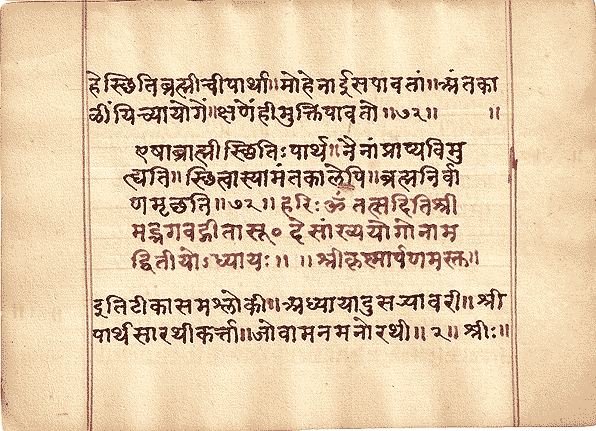BhG 2.72
eṣā brāhmī sthitiḥ pārtha naināṃ prāpya vimuhyati
sthitvāsyām anta-kāle ‘pi brahma-nirvāṇam ṛcchati
To play the media you will need to either update your browser to a recent version or update your Flash plugin.
syntax
he pārtha (O son of Pṛthā!),
eṣā (this) brāhmī (related to brahman) sthitiḥ (state) [asti] (it is).
enāṁ (this) prāpya (after obtaining) [naraḥ] (a person) na vimuhyati (he s not bewildered).
anta-kāle api (even at the time of death) asyām (in this) sthitvā (after standing),
brahma-nirvāṇam (final liberation in brahman) ṛcchati (he reaches).
grammar
| eṣā | – | etat sn. 1n.1 f. – this; |
| brāhmī | – | brāhmī 1n.1 f. – related to brahman (from: √bṛh – to increase, brahman – spirit, the Vedas); |
| sthitiḥ | – | sthiti 1n.1 f. – staying, state, condition, existence (from: √sthā – to stand); |
| pārtha | – | pārtha 8n.1 m. – O son of Pṛthā (from: √pṛth – to extend, pṛthā – Kuntī, mother of the sons of Pāṇḍu); |
| na | – | av. – not; |
| enām | – | etat sn. 2n.1 f. – this; |
| prāpya | – | pra-√āp (to obtain) absol. – after obtaining; |
| vimuhyati | – | vi-√muh (to become confused, bewildered, stupefied) Praes. P 1v.1 – he is bewildered, confused, stupefied; |
| sthitvā | – | √sthā (to stand) absol. – after standing; |
| asyām | – | idam sn. 7n.1 f. – in this; |
| anta-kāle | – | anta-kāla 7n.1 m.; TP: antasya kālaiti – at the end of time, at the time of death (from: anta – the end, limit, boundary, death; √kal – to count, kāla – time); |
| api | – | av. – although, moreover, besides, even; |
| brahma-nirvāṇam | – | brahma-nirvāṇa 2n.1 n.; TP: brahmaṇi nirvāṇam iti – final liberation in brahman (from: √bṛh – to increase, brahman – spirit, the Vedas; nir-√vā – to blow out, to extinguish, to soothe, nirvāṇa – extinction, perfect calm, death, final liberation); |
| ṛcchati | – | √ṛ (to go, to reach) or √ṛcch (to become stiff, to go) Praes. P 1v.1 – he goes, he reaches; |
textual variants
brāhmī → brahmī (sacred);
vimuhyati → vimuhyasi / vimucyati / na muhyati (you get bewildered / it liberates / he is not bewildered);
anta-kāle ‘pi → anta-kāle tu (but at the time of death);
brahma-nirvāṇam → brahma-niryāṇam (going away into brahman);
ṛcchati → ṛcchasi / icchati / ṛcchatu (you reach / he wants / he should reach);
Śāṃkara
The key:
an excerpt from the commented verse
quotes from the scriptures
starting polemic
| Knowledge leads to Divine Felicity. This devotion to knowledge is extolled as follows: |
saiṣā jñāna-niṣṭhā stūyate – | |
|
This is the Brāhmic state, O son of Pritha. |
eṣā brāhmī sthitiḥ pārtha naināṃ prāpya vimuhyati | sthitvāsyām anta-kāle ’pi brahma-nirvāṇam ṛcchati ||2.72|| |
|
|
This foregoing state – to renounce all and to dwell in Brahman – is the Divine state, the state of Brahman. It pertains to and has its being in Brahman. |
eṣā yathoktā brāhmī brahmaṇi bhavā iyaṃ sthitiḥ sarvaṃ karma saṃnyasya brahma-rūpeṇaiva avasthānam ity etat | | |
|
On reaching this state, one is no longer deluded. Remaining in this state even at the last period of life, one attains moksha, the felicity of Brahman. |
he pārtha, naināṃ sthitiṃ prāpya labdhvā na vimuhyati na mohaṃ prāpnoti | sthitvāsyāṃ sthitau brāhmyāṃ yathoktāyām anta-kāle ’pi antye vayasy api brahma-nirvāṇaṃ brahma-nirvṛtiṃ mokṣam ṛcchati gacchati | | |
|
And it needs no saying that he who renounces while yet a student and dwells in Brahman throughout life attains the Felicity of Brahman, the Brahma-Nirvāṇa. |
kim u vaktavyaṃ brahmacaryād eva saṃnyasya yāvaj jīvaṃ yo brahmaṇy eva avatiṣṭhate sa brahma-nirvāṇam ṛcchati iti ||2.72|| |
Rāmānuja
eṣā nityātma-jñāna-pūrvikā asaṅga-karmaṇi sthitiḥ sthita-dhī-lakṣaṇā brāhmī brahma-prāpikā, īdṛśīṃ karmaṇi sthitiṃ prāpya na vimuhyati na punaḥ saṃsāram āpnoti | asyāṃ sthityām antime’pi vayasi sthitvā brahma-nirvāṇam ṛcchati nirvāṇam ayaṃ brahma gacchati, sukhaikatānam ātmānam āpnoti ity arthaḥ |
evam ātma-yāthātmyaṃ yuddhākhyasya ca karmaṇas tat-prāpti-sādhanatām ajānataḥ śarīrātma-jñānena mohitasya tena ca mohena yuddhāt nivṛttasya tan-moha-śāntaye nityātma-viṣayā yā sāṃkhya-buddhiḥ, tat-pūrvikā cāsaṅga-karmānuṣṭhāna-rūpa-karma-yoga-viṣayā buddhiḥ sthita-prajñatā-yoga-sādhana-bhūtā dvitīye’dhyāye proktā | tad uktam—
nityātmā-saṅgaka-mohāgocara sāṃkhya-yoga-dhīḥ |
dvitīye sthita-dhīlakṣyā proktā tan-moha-śāntaye || [gītārtha-saṃgrahe 6] iti
Śrīdhara
uktāṃ jñāna-niṣṭhāṃ stuvann upasaṃharati eṣeti | brāhmī sthitir brahma-jñāna-niṣṭhā | eṣaivaṃvidhā | enāṃ parameśvarārādhanena viśuddhāntaḥkaraṇaḥ pumān prāpya na vimuhyati | punaḥ saṃsāra-mohaṃ na prāpnoti | yato ‚nta-kāle mṛtyu-samaye ‚py asyāṃ lakṣa-mātram api sthitvā brahma-nirvāṇam brahmaṇi nirvāṇaṃ layam ṛcchati prāpnoti | kiṃ punar vaktavyaṃ bālyam ārabhya sthitvā prāpnotīti
Madhusūdana
tad evaṃ caturṇāṃ praśnānām uttara-vyājena sarvāṇi sthita-prajña-lakṣaṇāni mumukṣu-kartavyatayā kathitāni | samprati karma-yoga-phala-bhūtāṃ sāṅkhya-niṣṭhāṃ stuvann upasaṃharati eṣeti | eṣā sthita-prajña-lakṣaṇa-vyājena kathitā | eṣā te ‚bhihitā sāṅkhye buddhir iti ca prāg uktā sthitir niṣṭhā sarva-karma-saṃnyāsa-pūrvaka-paramātma-jñāna-lakṣaṇā brāhmī brahma-viṣayā | he pārtha ! enāṃ sthitiṃ prāpya yaḥ kaścid api pnar na vimuhyati | na hi jñāna-bādhitasyājñānasya punaḥ sambhavo ‚sti anāditvenotpatty-asambhavāt | asyāṃ sthitāv anta-kāle ‚pi antye ‚pi vaayasi sthitvā brahma-nirvāṇaṃ brahmaṇi nirvāṇaṃ nirvṛttiṃ brahma-rūpaṃ nirvāṇam iti vā | ṛcchati gacchaty abhedena | kim u vaktavyaṃ yo bramacaryād eva saṃnyasya yāvaj-jīvam asyāṃ brāhmyāṃ sthitāv avatiṣṭhate sa brahma-nirvāṇam ṛcchatīty api-śabdārthaḥ
Viśvanātha
upasaṃharati eṣeti | brāhmī brahma-prāpikā | anta-kāle mṛtyu-samaye ‚pi | kiṃ punar ābālyam
Baladeva
sthita-prajñatāṃ stauti eṣeti | brāhmī brahma-prāpikā | anta-kāle carame vayasi | kiṃ punar ākaumāraṃ brahma ṛcchati labhate | nirvāṇam amṛta-rūpaṃ tat pradam ity arthaḥ | nanu tasyāṃ sthitaḥ kathaṃ brahma prāpnoti | tat-prāptes tad-bhakti-hetukatvād iti ced ucyate | tasyās tad-bhakti-hetukatvāt tad-bhakti-hetutvāc ca tat-prāpakateti
- Copyright © 2010-2013 Quo Vadis Vision. Wszelkie prawa zastrzeżone.
- |
- About the project
- Appendices
- Audio
- Forum
- Contact

